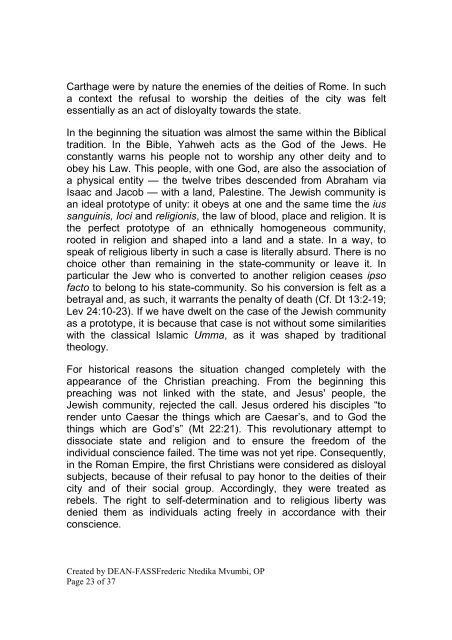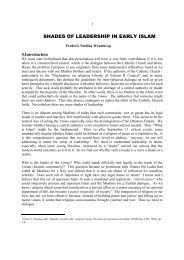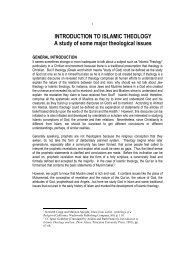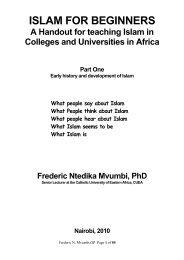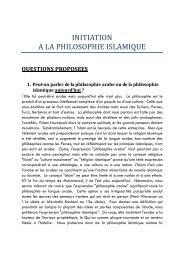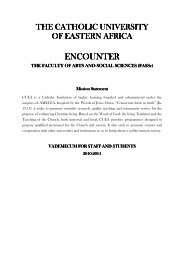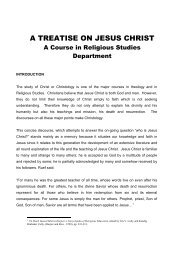PRINCIPLES FOR INTERRELIGIOUS DIALOGUE.pdf - CUEA
PRINCIPLES FOR INTERRELIGIOUS DIALOGUE.pdf - CUEA
PRINCIPLES FOR INTERRELIGIOUS DIALOGUE.pdf - CUEA
You also want an ePaper? Increase the reach of your titles
YUMPU automatically turns print PDFs into web optimized ePapers that Google loves.
Carthage were by nature the enemies of the deities of Rome. In such<br />
a context the refusal to worship the deities of the city was felt<br />
essentially as an act of disloyalty towards the state.<br />
In the beginning the situation was almost the same within the Biblical<br />
tradition. In the Bible, Yahweh acts as the God of the Jews. He<br />
constantly warns his people not to worship any other deity and to<br />
obey his Law. This people, with one God, are also the association of<br />
a physical entity — the twelve tribes descended from Abraham via<br />
Isaac and Jacob — with a land, Palestine. The Jewish community is<br />
an ideal prototype of unity: it obeys at one and the same time the ius<br />
sanguinis, loci and religionis, the law of blood, place and religion. It is<br />
the perfect prototype of an ethnically homogeneous community,<br />
rooted in religion and shaped into a land and a state. In a way, to<br />
speak of religious liberty in such a case is literally absurd. There is no<br />
choice other than remaining in the state-community or leave it. In<br />
particular the Jew who is converted to another religion ceases ipso<br />
facto to belong to his state-community. So his conversion is felt as a<br />
betrayal and, as such, it warrants the penalty of death (Cf. Dt 13:2-19;<br />
Lev 24:10-23). If we have dwelt on the case of the Jewish community<br />
as a prototype, it is because that case is not without some similarities<br />
with the classical Islamic Umma, as it was shaped by traditional<br />
theology.<br />
For historical reasons the situation changed completely with the<br />
appearance of the Christian preaching. From the beginning this<br />
preaching was not linked with the state, and Jesus' people, the<br />
Jewish community, rejected the call. Jesus ordered his disciples “to<br />
render unto Caesar the things which are Caesar’s, and to God the<br />
things which are God’s” (Mt 22:21). This revolutionary attempt to<br />
dissociate state and religion and to ensure the freedom of the<br />
individual conscience failed. The time was not yet ripe. Consequently,<br />
in the Roman Empire, the first Christians were considered as disloyal<br />
subjects, because of their refusal to pay honor to the deities of their<br />
city and of their social group. Accordingly, they were treated as<br />
rebels. The right to self-determination and to religious liberty was<br />
denied them as individuals acting freely in accordance with their<br />
conscience.<br />
Created by DEAN-FASSFrederic Ntedika Mvumbi, OP<br />
Page 23 of 37


